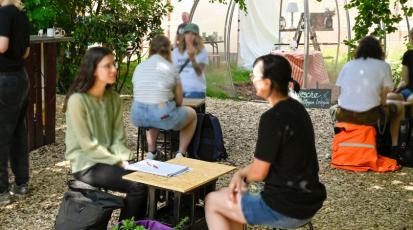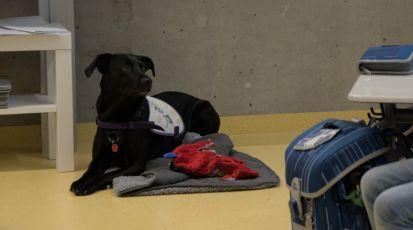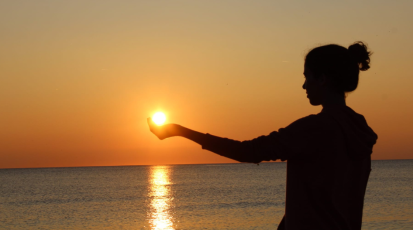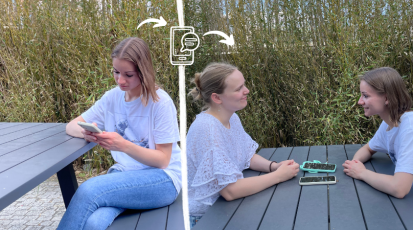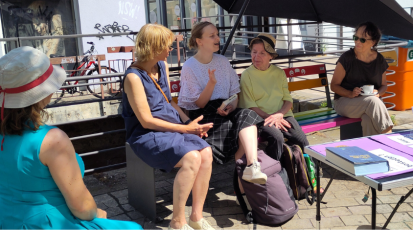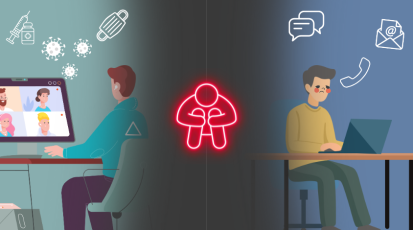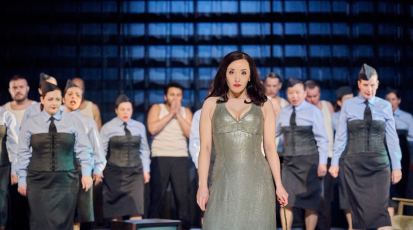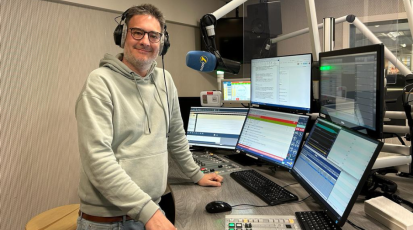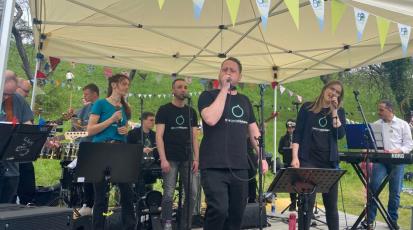"Everyone feels a sense of lightness when they sing, and everyone realises that we are a community here."
Thank you for the music
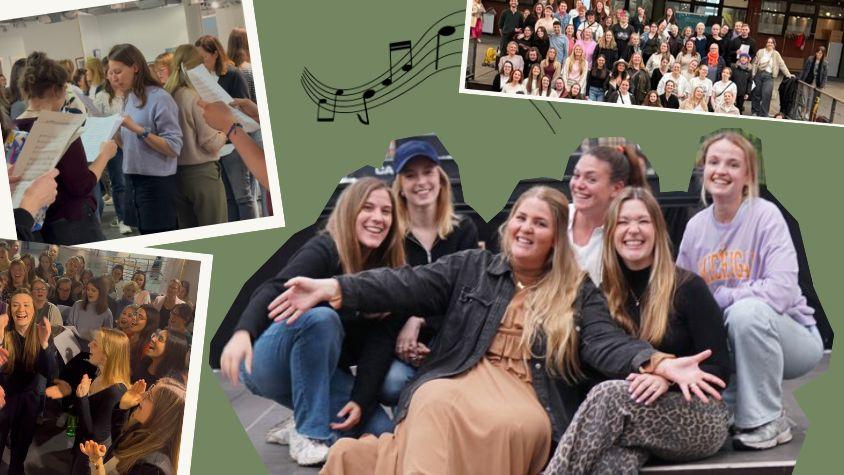
An old, covered railway hall. A small stage. A bar. A room that gradually fills up with people. In a few minutes, people will assemble a choir here. People who have never met before.
An open choir that anyone can join – without special requirements or pressure to perform. This is the concept behind “The Voice Collective Hamburg”. A place for everyone who wants to sing and for people to come together through music. The idea is simple. That is what makes it special. One song, one evening. And lots of opportunities to meet new people?
The Voice Collective was started in September 2024, drawing inspiration from a model known as the Gaia Music Collective in Brooklyn. “We wanted to create an inclusive choir where you don't have to be present every week. Where you can just turn up and sing in a relaxed way, without paying anything. And we wanted to do it in a cool, urban way,” reveals Lisa Fischer, the founder of the One Day Choir. The events take place at the Gleishalle Oberhafen, a cultural venue in Hamburg that has been revitalised as a socio-cultural and innovative meeting place.
A choir as a social bridge?
“Actually, a lot of people come alone. I would say it's half of the participants. The others come with friends, colleagues, or family,” says Lisa Fischer.
Qualitative findings from a cross‐national survey of choir members analysed the benefits of choral singing for social and mental wellbeing. The results showed that singing in a group encourages the release of endorphins and oxytocin – hormones associated with positive emotions, social trust, and bonding.
“I think it's just the perfect moment to get to know each other. Because everyone is there with the same ambition. Everyone is there with a love of music and singing and wants to experience the same thing,” enthuses the founder of The Voice Collective. Further, she reports that this sense of connection also has a positive effect on the opportunity to meet new people. That is how the idea of creating a meeting place for those who come alone emerged from one of the participants. A chance for people to connect with others and have a conversation. Additionally, there are also warm-up exercises at the beginning. “Everyone starts chattering, and it's totally beautiful,” mentions Lisa Fischer.
Loneliness in our society
Nowadays, more and more people are feeling lonely. Although this social problem may not be immediately visible, it poses a serious challenge to society. This raises the question: what is loneliness? To clarify this, it is important to emphasise that loneliness is not the same as being alone. As noted by the Joint Research Centre: EU Science Hub of the European Commission, being alone or in social isolation is a measurable, objective state based on the number of social contacts a person has, whereas loneliness is a mostly negative subjective experience. According to a representative survey published by the Bertelsmann Stiftung on the topic of "How lonely are young adults in 2024?", 60 per cent of respondents aged 16 to 30 feel emotionally lonely, while 39 per cent feel socially lonely. Social loneliness, by definition, is the experience of not having a wider social network of friends, neighbours or colleagues.
More stories on loneliness and connection from an international perspective can be found by following this link!
Creating encounters
Initiatives like the One Day Choir provide a chance for people to connect, with music serving as a common ground.
Gunter Kreutz is a professor of systematic musicology at the Carl von Ossietzky University of Oldenburg. His field of research focuses on the psychological, physical, and social meanings of making music, singing, and dancing. He explains that even newborns are sensitive to rhythms and metres. “It is not so much about words but about behaviour, perception, and sharing positive feelings and strong emotions. This continues into adulthood. For example, when searching for a partner or forming new friendships. Therefore, musical events can be very good places to meet people.”
Research shows that choral singing can help adults experiencing mental illness to overcome problems related to anxiety, depression, and social isolation. Based on a study by The Royal Society Publishing, this could be the “ice-breaker effect”. The study shows that, compared to a group that simply met, a group that sang together demonstrated a significantly greater increase in closeness.
However, it is important to consider that it is not entirely clear whether another social engagement would have a similar effect.
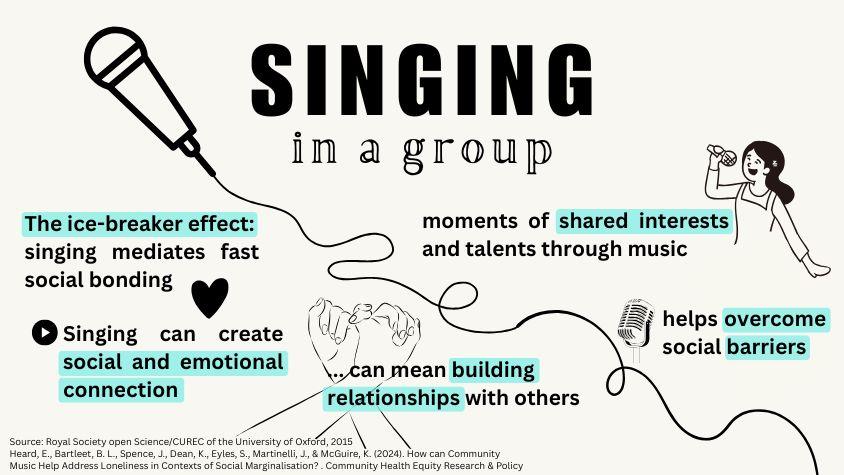
Today, the team of the one-day choir consists of six people, including a musical performer, a music teacher and a guitarist. Together, they have created a safe space for singing and community.
Gunter Kreutz likes to call these people “musical activists”. He emphasises that those are the people who do something in their environment and with their possibilities. Things like taking a guitar into a retirement home and singing with the people, starting a One Day Choir, or other social offers. “For me, they are the everyday heroes who make a difference. Unfortunately, the important role that these people play in encouraging human togetherness is often overlooked.”
Auch interessant
A seemingly visible collective feeling
At "The Voice Collective", everyone can join in. This diversity is something that makes the choir special to Lisa Fischer. “It is always a new vibe and a new atmosphere. And we are also barrier-free.” There are no costs for the participants. Only a binding registration for one evening is necessary so that the number of participants can be estimated.
During the event, people sing, laugh, clap and move together to the music. At each session, a different song is rehearsed together with a host – such as “Defying Gravity” from the musical Wicked, “Shallow” by Lady Gaga and Bradley Cooper, or John Lennon's “Imagine”. Accompanied by a small band.
Although many aspects speak in favour of the events, expert Gunter Kreutz draws attention to the fact that the question of overcoming the obstacle remains unanswered. “After all, the people who attend such an event are there for a reason and have already decided to take part. I think the decisive factor is how high the threshold is perceived to be and how much effort is required to sign up and actually attend.”
In addition, loneliness can be a temporary feeling that comes and goes, or it can be situational, meaning that it only occurs at certain times due to particular life circumstances. However, as the European Commission points out, it can also become chronic, so that a person suffers from it permanently. “One thing should never be underestimated. People are all very different. For people with severe mental health problems, attending an event like this is a success in itself”, explain the musicologists.
Without a song or a dance, what are we?
After the singing, there is time to chat and connect with the other participants. Those who want to can also take part in a closing meditation. This unique atmosphere is what makes every gathering so meaningful for Julia Fischer. “After two hours of rehearsing the song, I always see lots of smiling faces. Everyone feels a sense of lightness when they sing, and everyone realises that we are a community here.”
In a way, the choir evening seems to show that music can create a setting in which it is possible to connect people – even if they have never met before.
If you are struggling with loneliness yourself, there are various services where you can get help at any time. In Germany, for instance, you can find a list of support centres via the ‘Kompetenznetz Einsamkeit’ website. An international offer is ‘Find A Helpline’, a tool that connects people in over 130 countries with certified counselling services that can be searched by topic – including loneliness.


